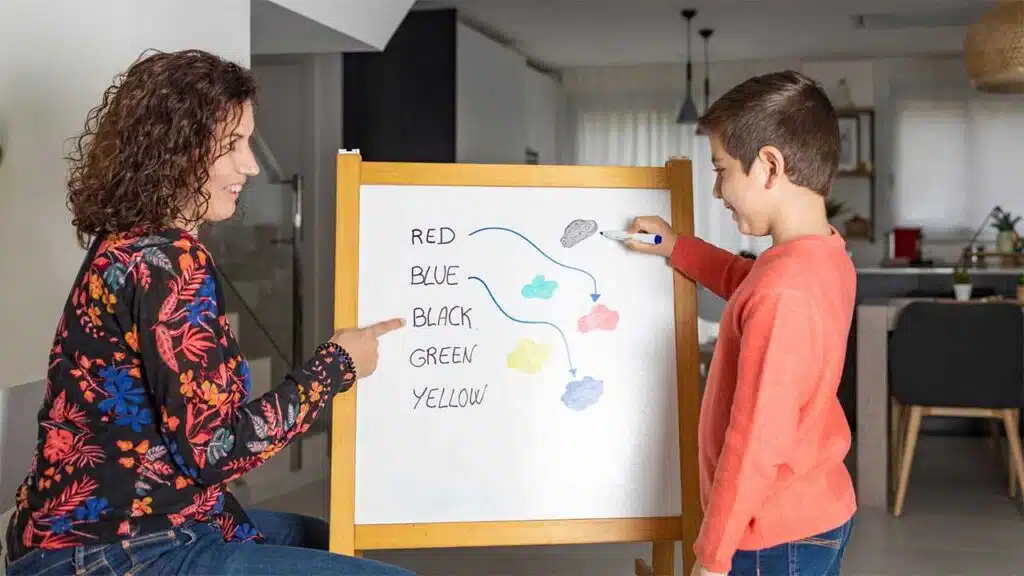Getting kids excited about school can be tough. Many parents worry when their children lose interest in learning or struggle with motivation. But there are ways to help your child succeed academically.
You can motivate your child to do better in school by staying positive, fostering their interests, and creating a supportive environment at home.
Small changes in your approach can make a big difference in your child’s attitude toward school and learning. With some patience and effort, you can help your kid reach their full potential in the classroom.
1. Create a Reward System
Setting up a reward system can help motivate your child to do better in school. This method uses positive reinforcement to encourage good behavior and academic performance.
Start by choosing specific goals for your child. These could be getting good grades, finishing homework on time, or reading for 30 minutes each day. Make sure the goals are clear and achievable.
Next, decide on rewards that your child will find exciting. These can be small daily rewards or bigger weekly or monthly prizes. Some ideas include extra screen time, a special outing, or a new toy.
Use a visual chart to track progress. A simple sticker chart works well for younger kids. Older children might prefer a digital app or a more grown-up looking calendar.
Be consistent with giving rewards. When your child meets a goal, give the agreed-upon reward right away. This helps reinforce the connection between good behavior and positive outcomes.
Remember to praise your child’s efforts, not just results. Celebrate small improvements and hard work, even if they don’t reach the ultimate goal every time.
Adjust the system as needed. If it’s not working, talk to your child about what changes might help. The reward system should be a positive experience for both of you.
2. Set Clear and Achievable Goals
Setting goals can help your child stay focused and motivated in school. Talk with your child about what they want to achieve. Help them pick goals that are specific and doable.
For example, instead of “do better in math,” aim for “improve math grade from C to B this quarter.” This gives your child a clear target to work towards.
Break big goals into smaller steps. If your child wants to read more, start with one book a month. Then slowly increase the goal as they progress.
Write down the goals and put them somewhere visible. This reminds your child what they’re working towards. You can use a whiteboard or colorful poster to make it fun.
Celebrate when your child reaches their goals, even small ones. This builds confidence and motivates them to keep going. A high-five or special treat can go a long way.
Remember to adjust goals as needed. If a goal seems too hard, it’s okay to change it. The aim is to challenge your child without overwhelming them.
3. Encourage a Growth Mindset
A growth mindset can help your child do better in school. It means believing that skills can improve with effort and practice.
You can teach your child that the brain grows like a muscle. When they face tough tasks, their brain gets stronger. This helps them see challenges as chances to learn.
Praise your child’s effort, not just results. Say things like “You worked hard on that math problem!” instead of “You’re so smart!” This shows them that trying matters.
Help your child set goals and make plans to reach them. Break big tasks into smaller steps. This makes hard things feel more doable.
When your child makes mistakes, treat them as learning chances. Ask what they learned and how they might do it differently next time.
Teach your child to use “yet” when they struggle. Instead of “I can’t do this,” they can say “I can’t do this yet.” This small word shows there’s always room to grow.
Share stories of people who got better at things through practice. This can inspire your child to keep trying, even when things are hard.
Remember, your words and actions shape your child’s mindset. Stay positive and show that you believe in their ability to learn and improve.
4. Provide a Quiet Study Space
A quiet study space can make a big difference in your child’s learning. Pick a spot in your home that’s away from noise and distractions. This could be a corner of their bedroom or a nook in the living room.
Make sure the area has good lighting. Natural light is best, but a desk lamp works too. Get a comfortable chair and a desk or table that’s the right size for your child.
Keep the space tidy and organized. Have shelves or bins for books and supplies. A clutter-free area helps your child focus on their work.
Set up a schedule for using the study space. This creates a routine and helps your child get in the right mindset for learning.
Remove gadgets and toys from the area. These can distract your child from their studies. If they need a computer for homework, set rules for its use.
Consider using noise-canceling headphones if your home is often noisy. This can help your child concentrate on their work.
Personalize the space with your child’s input. Let them choose some decorations or posters. This makes the area more inviting and encourages them to use it.
5. Use Educational Apps
Educational apps can make learning fun for kids. These apps use games and activities to teach subjects like math, reading, and science. They help keep children engaged while building important skills.
Many apps let kids learn at their own pace. This can boost confidence and reduce stress. You can find apps for almost any subject your child needs help with.
Some apps give rewards for progress. This can motivate kids to keep learning. Look for apps that match your child’s interests and learning style.
Try using educational apps together with your child at first. This can help them get started and show you care about their learning. As they get more comfortable, let them use the apps on their own.
Set limits on app use to balance screen time with other activities. Make sure the apps you choose are age-appropriate and high-quality. Ask teachers for recommendations if you’re not sure where to start.
Remember, apps should support learning, not replace other forms of education. Use them as one tool among many to help your child succeed in school.
6. Get Involved in Their Homework
Getting involved in your child’s homework shows you care about their education. It can boost their motivation and help them do better in school.
Set up a regular homework time each day. This creates a routine and helps your child stay on track. Make sure they have a quiet, comfortable space to work.
Sit with your child while they do homework. Be there to answer questions or offer help if needed. This doesn’t mean doing the work for them. Instead, guide them to find answers on their own.
Ask about what they’re learning. Show interest in their subjects and assignments. This can make homework feel more meaningful to your child.
Praise their efforts, not just grades. When they work hard, let them know you notice. This can encourage them to keep trying, even when things are tough.
If your child struggles, talk to their teacher. Find out how you can support their learning at home. Working together with the school can make a big difference.
Remember, your goal is to help your child become independent. As they improve, let them take more responsibility for their work. Be there if they need you, but allow them to grow and learn on their own.
7. Maintain Consistent Routines
Kids thrive on routine. Set regular times for homework, meals, and bedtime. This helps your child feel secure and know what to expect.
Make a schedule together. Let your child help plan their after-school routine. This gives them a sense of control and ownership.
Stick to the routine as much as possible. Be firm but flexible when needed. If something comes up, explain the change to your child.
Create a homework spot. Pick a quiet place with good lighting. Keep supplies handy so your child can focus on their work.
Set a regular bedtime. Kids need enough sleep to do well in school. A consistent sleep schedule helps them feel rested and ready to learn.
Use a visual schedule. Put a chart on the fridge or in their room. This helps younger kids remember their daily tasks.
Build in free time too. Don’t overschedule. Kids need time to relax and play.
Be patient. New routines take time to stick. Praise your child for following the schedule. Soon it will become a habit.
8. Incorporate Short Breaks
Taking short breaks can boost your child’s focus and productivity. Let your kid pause for 5-10 minutes after 30-45 minutes of studying. This helps refresh their mind and avoid burnout.
During breaks, encourage your child to stretch, have a snack, or do a quick fun activity. These mini-breaks can help them return to their work with renewed energy and concentration.
Try using a timer to set clear work and break periods. This teaches your child time management skills. It also gives them something to look forward to while working.
Make sure breaks don’t turn into long distractions. Keep them short and structured. This helps your child maintain their study rhythm and complete tasks more effectively.
Remember, everyone’s needs are different. Work with your child to find the right balance of study time and breaks that works best for them.
Understanding Your Child’s Motivations
Different things motivate kids. Some love to learn, while others need praise or rewards. Knowing what makes your child tick can help them do better in school.
The Role of Intrinsic vs Extrinsic Motivation
Intrinsic motivation comes from within. It’s when your child wants to do well because they enjoy learning. This type of motivation is powerful and long-lasting.
Extrinsic motivation comes from outside rewards. It could be praise, good grades, or treats. While it can work in the short term, it may not build a love for learning.
Try to boost your child’s inner drive. Praise their effort, not just results. Show interest in what they’re learning. Help them see how school subjects connect to real life.
But don’t ignore outside rewards completely. A mix of both types can work well. Just be careful not to overdo it with prizes or money for grades.
Identifying Individual Interests
Every child is unique. What excites one might bore another. Pay attention to what lights up your child’s eyes.
Do they love animals? Link their science homework to nature. Are they into sports? Use math to track game stats.
Ask your child what they enjoy most about school. Listen closely to their answers. You might spot hidden interests.
Try different activities at home. Watch what holds their attention. Use these clues to make learning more fun.
Talk to their teachers. They might see sides of your child that you don’t. Together, you can find ways to spark your child’s curiosity in class.
Establishing Effective Study Routines
Setting up good study habits helps kids do better in school. A regular schedule and the right place to study can make a big difference.
Creating a Consistent Schedule
Make a study plan with your child. Pick times that work well each day. Try to stick to these times as much as you can. This helps your child get used to studying regularly.
Use a timer to break study time into small chunks. This keeps your child focused. Let them take short breaks between study sessions. This helps them stay fresh and ready to learn.
Reward your child for following the schedule. This can be as simple as praising them or giving them a small treat. It shows them that their hard work pays off.
Designing a Productive Study Environment
Set up a quiet spot for your child to study. Make sure it has good lighting and is away from TVs or other noisy things. This helps your child focus on their work.
Keep all study materials in one place. Have pens, paper, and books ready to use. This saves time and makes it easier to get started.
Make the study area comfortable. Use a chair that supports good posture. Keep the room at a nice temperature. A comfy space makes studying more pleasant.
Remove distractions like phones or tablets during study time. This helps your child stay on task. You can use apps to block certain websites if needed.
Building Strong Parent-Teacher Relationships
Working with your child’s teachers is key to their success in school. Good teamwork between you and the teachers helps your child learn better and feel more supported.
Regular Communication with Teachers
Talk to your child’s teachers often. You can use email, phone calls, or in-person meetings. Share important information about your child, like their interests or any challenges they face. Ask teachers how your child is doing in class and what you can do to help at home.
Set up a system to stay in touch. Maybe you’ll email once a week or meet once a month. This keeps you up to date on your child’s progress. It also lets you spot and fix any issues quickly.
Don’t wait for problems to talk to teachers. Share good news too. Tell them when your child enjoys a lesson or does well on homework. This builds a positive relationship.
Collaborative Goal Setting
Work with teachers to set goals for your child. Talk about what your child needs to learn and how to get there. Make sure the goals are clear and doable.
Break big goals into smaller steps. This makes them less scary and easier to track. For example, if the goal is to improve math grades, you might start with doing extra practice problems each week.
Check in on these goals often. Talk to your child and their teacher about progress. Celebrate small wins along the way. This keeps everyone motivated and on track.
If your child struggles, work with the teacher to adjust the plan. Maybe they need different study methods or extra help in certain areas. Be open to trying new approaches.
Final Thoughts
Motivating your child to do better in school is not just about pushing them harder; it’s about creating an environment where they feel supported, encouraged, and inspired to learn.
By implementing these eight proven strategies, you can help your child develop a positive attitude toward education, build confidence in their abilities, and foster a lifelong love of learning. Remember, every child is unique, and finding the right approach may take time and patience.
However, with consistent effort and a focus on nurturing your child’s intrinsic motivation, you can set them on the path to academic success and beyond.





































